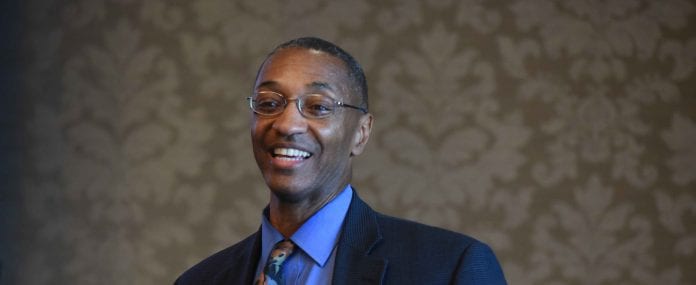Belmont’s College of Liberal Arts and Social Sciences hosted Dr. William Tate this week as part of the University’s Scholar-in-Residence program, an initiative created by the Welcome Home Team that brings diverse scholars–deans, senior administrators, presidents or other scholars– whose lives and careers serve as an inspiration to underrepresented students. These interactions allow the Belmont community to engage with scholars from across the country who have made an impact on higher education and their industries, while further familiarizing students with career options in academia.
Tate is the Edward Mallinckrodt Distinguished University Professor in Arts & Sciences at Washington University in St. Louis. Currently, he serves as Dean of the Graduate School and Vice Provost for Graduate Education.
While on campus, Tate presented sessions to students, faculty and staff and served as the keynote speaker at The Collaborative for Collegiality, an initiative between the Colleges of Liberal Arts and Social Sciences and Sciences and Mathematics where K-12 teacher work together in interdisciplinary ways through engaging topics like cooking, gardening and storytelling. Tate discussed how teachers can support all student learning through these topics, particularly vulnerable urban youth.
He also presented “Who is My Neighbor? The Geography of Opportunity in Ferguson and Beyond,” a convocation session held on Monday morning. The talk detailed events in Ferguson, Missouri and allowed attendees to examine critical questions surrounding how politics, practices and folkways created the conditions in Ferguson and the broader St. Louis region. To do so, Tate used geospatial methods to create visuals and determine if racial segregation, economic opportunity, health and developmental outcomes and education-related outcomes are spatially arranged. He concluded his session by offering hopeful recommendations for improvement.
On Tuesday, Tate led a discussion surrounding “STEM Education: Is Geography Destiny?” where he discussed the implications of Tobler’s first law of geography for opportunities in STEM learning. He illustrated the relationship between place and STEM attainment, highlighting challenges related to urban and rural areas and available interventions. He also addressed state mandates for equal opportunity and the intended and unnitended consequences of those mandates.
Dean of the College of Liberal Arts and Social Sciences Dr. Bryce Sullivan said, “While at Belmont, Dr. Tate brought to bear a combination of deep intellect, solid research on urban communities and a thoughtful Christian perspective to some of the important social issues of the day. He has a gift for speaking and engaging his audience. His description of his own experiences and reactions in the aftermath of the Michael Brown shooting in Ferguson, Missouri, as a professor, administrator and Christian, brought insight to personal and institutional responses to social determinants of poverty and systemic educational problems.”



